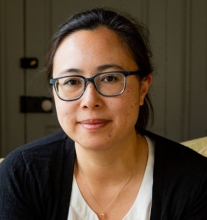MSE 298 Seminar: New Platforms For Quantum Sensing and Quantum Computing

Associate Professor
Department of Electrical and Computer Engineering
Princeton University
Abstract: The nitrogen vacancy (NV) center in diamond exhibits spin-dependent fluorescence and long spin coherence times under ambient conditions, enabling applications in quantum information processing and sensing. NV centers near the surface can have strong interactions with external materials and spins, enabling new forms of nanoscale spectroscopy. However, NV spin coherence degrades within 100 nanometers of the surface, suggesting that diamond surfaces are plagued with ubiquitous defects. I will describe our recent efforts to correlate direct materials characterization with single spin measurements to devise methods to stabilize highly coherent NV centers within nanometers of the surface. We deploy these coherent shallow NV centers for a new nanoscale sensing technique, whereby we use covariance measurements of two or more NV centers to measure two-point magnetic field correlators.
Our approach for correlating surface spectroscopy techniques with single qubit measurements to realize directed improvements is generally applicable to many systems. Separately, I will describe our recent efforts to tackle noise and microwave losses in superconducting qubits. Building large, useful quantum systems based on transmon qubits will require significant improvements in qubit relaxation and coherence times, which are orders of magnitude shorter than limits imposed by bulk properties of the constituent materials. This indicates that loss likely originates from uncontrolled surfaces, interfaces, and contaminants. Previous efforts to improve qubit lifetimes have focused primarily on designs that minimize contributions from surfaces. However, significant improvements in the lifetime of planar transmon qubits have remained elusive for several years. We have recently fabricated planar transmon qubits that have both lifetimes and coherence times exceeding 0.3 milliseconds by using tantalum as the material in the capacitor. Following this discovery, we have parametrized the remaining sources of loss in state-of-the-art devices using systematic measurements of the dependence of loss on temperature, power, and geometry. This parametrization, complemented by direct materials characterization, allows for rational, directed improvement of superconducting qubits.
Bio: Nathalie de Leon is an associate professor of Electrical and Computer Engineering at Princeton, where she focuses on quantum sensing with NV centers in diamond, quantum networks with solid state defect systems and nanophotonics, and new material platforms for superconducting qubits. She received her B.S. from Stanford University in 2004 and Ph.D. from Harvard University in 2011. She then worked as a CIQM and Element Six postdoctoral fellow at Harvard. Nathalie joined the faculty of Princeton University as an assistant professor in Electrical and Computer Engineering in 2016, where she was later promoted to associate professor. Her group works at the interface of quantum optics, atomic physics, condensed matter and device physics, materials science, surface spectroscopy, nanofabrication, and spin physics to uncover sources of noise and loss in quantum systems and uses these insights to design new quantum platforms. She is currently the materials thrust leader of the Co-design Center for Quantum Advantage, a DOE National Quantum Information Science Center, and she was elected as Vice Chair of the APS Division of Quantum Information in 2024. Nathalie received the Air Force Office for Scientific Research Young Investigator Award in 2016, the Sloan Research Fellowship in Physics in 2017, the NSF CAREER Award in 2018, the DARPA Young Faculty Award in 2018, and the DOE Early Career Award in 2018, the Gordon and Betty Moore Foundation Experimental Physics Investigator Award in 2023 and the APS Rolf Landauer and Charles H. Bennett Award in Quantum Computing in 2023.
Share
Related Content
| Attachment | Size |
|---|---|
| 2.36 MB |
Upcoming Events
-
MSE Special Seminar: Revolutionizing Battery Technology - Engineering Quantum Materials for Enhanced Safety and Performance in Solid Electrolytes
-
MSE Special Seminar: Designing Sustainable Soft Matter from the Molecule Up
-
EECS Seminar: On-device Contextual AI – Challenges and Opportunities
-
MAE 298 SEMINAR: Control and Estimation of Turbulent Shear Flows using Modal Analysis
-
MSE Special Seminar: Organic Semiconductor-incorporated Perovskites (OSIP) – A New Family of Hybrid
